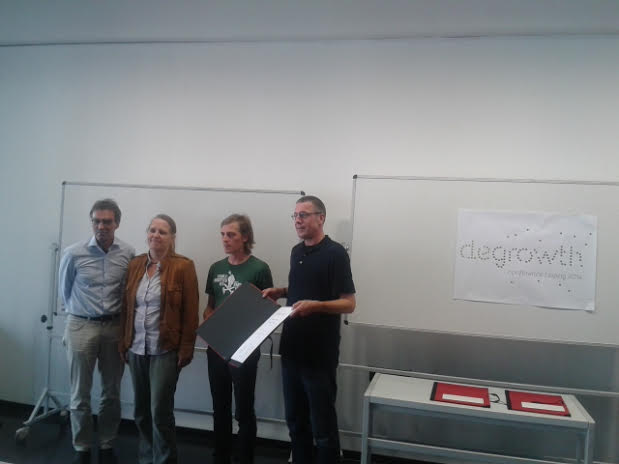As policy makers return from Marrakesh puzzling over what a Trump presidency means for the Paris agreement, it is fascinating and wonderful to watch, from a desk in one of the biggest anti-poverty and development organisations, the increased energy, depth, and passion of the degrowth movement.
But this movement is unfortunately peripheral to many development conversations. Perhaps that is because degrowth is aimed, first and foremost, at economic models in the ‘global north’. This focus does not align with the global south focus of most development organisations, including Oxfam.
But degrowth and development are two sides of the same coin because the root causes of many humanitarian emergencies in the south lie in economic policy and personal choices made in the north. For example, many are caused by climate change, a function of the excessive, disproportionate, and, to be honest, selfish levels of emissions associated with richer people’s consumption. Most of whom live in the global north.
If we take the science of planetary boundaries seriously, then degrowth – in the sense of massive reduction in resource use and recognising that wellbeing is about more than consumption – is urgently needed in the global north. The north needs to make ecological space for the south. If this does not occur, then the message is that countries in the global south must remain content and resigned to lower living standards. And development organisations will be fighting to eradicate poverty for centuries to come.
So degrowth is critical from a development perspective, despite its northern orientation. It focuses on the belly of the beast; on changing the economic goals and models of countries who are ruining the possibilities of a good life not only for themselves, but for so many others as well.
It is all very well to say, as so many still do, that poverty will be reduced by growing the pie so everyone has bigger slices. This lets us off the hook of changing our system as it presumes that we don’t need to worry if some people have too large a slice compared to others.
This argument might have been mildly plausible decades ago. But when our planet is exceeding four of the nine planetary boundaries; when we are facing the 6th mass extinction; when resource constraints mean violence over water and land; and when mass migration as people seek habitable land is forecast to characterise the 21st century, then that recipe for poverty reduction just won’t cut it.
Our collective reality is one of limits – we ignore them at our collective peril. So we can’t just grow the pie – we must talk about distributing the world’s resources: within countries and between countries.
That conversation needs to be very nuanced. The understandable reaction many in the global south will – and do – have to degrowth is:
You in the north have had your fun, you’ve raised your living standards, and now you want us to stop our economy growing just when it is paying for hospitals? You want us to go camping just when we can afford our first flight? You want us to go renewable just when we’ve got the technology to extract our fossil fuel resources? You want us to do community gardening just when the first shopping mall is opening up...?
These are understandable instant reactions when people come across the notion of degrowth. I would offer two responses:
Fortunately, much inspiration for economic models that prioritise wellbeing and getting the economy right the first time around already exists in many countries in the global south. And of course this is something degrowth scholars recognise with their attention to Buen Vivir and other ways of thinking about development that do not conflate it with ever-rising GDP.
Degrowth may not on the tip of the tongue of so-called ‘development professionals’. But their job is certainly going to be made easier the more traction degrowth gets in the global north.
In a recently published article in Nature Climate Change, Jeroen van den Bergh argues that neither degrowth nor green-growth strategies might lead to sufficient climate action and hence makes the case for a third option which he calls “agrowth”. While the understanding of degrowth reflected in the article can certainly be disputed – it comes across as mainly targeting a shrinking GDP – his conc...
Dieser Text ist eine gekürzte Fassung des Beitrages zur Jugendumweltbewegung für „Degrowth in Bewegung(en)“ Wir sind beide langjährig mit der BUNDjugend ehren- beziehungsweise hauptamtlich verbunden und sprechen daher vor allem für diesen verbandsgeprägten und organisierten Teil der Jugendumweltbewegung. Gleichzeitig fühlen wir uns als Teil der Degrowth-Bewegung. Dieser Text ist eine subjekti...

Der Kapp-Forschungspreis für Ökologische Ökonomie ging dieses Jahr an Matthias Schmelzer, Corinna Burkhart und Dirk Posse. Die Verleihung des mit 5.000 Euro dotierten Preises zur wissenschaftlichen Nachwuchsförderung fand am 5. September auf einer feierlichen Veranstaltung im Rahmen der Degrowth-Konferenz statt. Aus den 25 eingereichten Studien wurden drei für einen Preis ausgewählt. Der Hist...